Within the biblical narrative, Achsah emerges as a symbol of women's agency, inviting deeper exploration into her unique story and its implications.
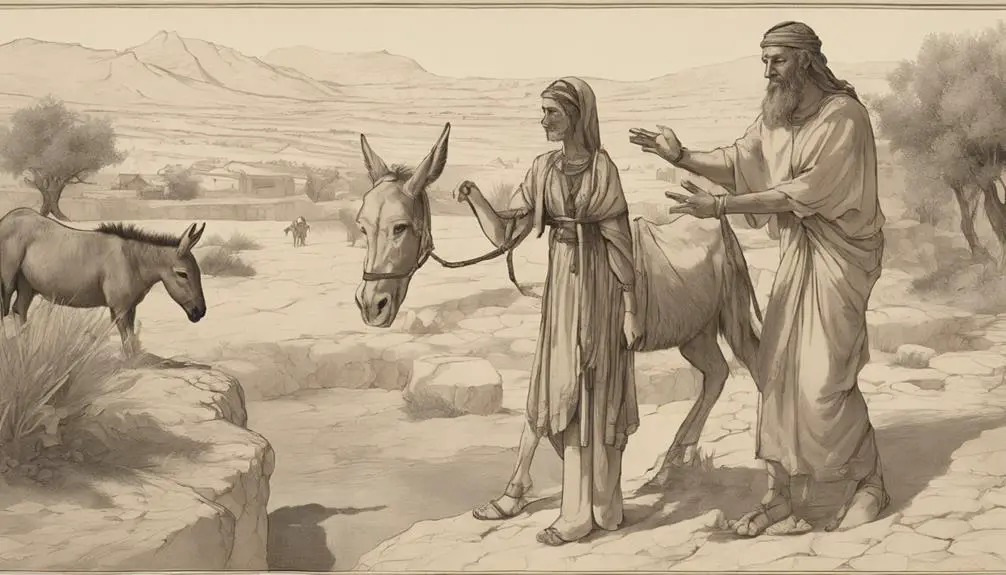
Achsah in the Bible
Like a gem hidden in plain sight, Achsah's story in the Bible offers a unique glimpse into women's agency in ancient times.
You'll find her narrative nestled within the conquests and allotments of land in the Book of Joshua, where her bold request to her father, Caleb, showcases her assertive character.
This account not only illuminates her personal legacy but also opens a broader conversation about the roles women played in biblical narratives.
As you explore Achsah's journey, consider what her actions reveal about the socio-cultural context of her time and the subtle yet significant ways women navigated their agency.
What insights can her story offer about the complexities of women's lives in biblical history?
Key Takeaways
- Achsah, Caleb's daughter, leveraged marriage and land requests to navigate and assert her agency within ancient Israelite patriarchal society.
- Her strategic request for springs of water illustrates the crucial role of water resources in ancient agricultural communities for wealth and survival.
- Achsah's narrative showcases the nuanced ways women could exercise influence and secure economic resources within their familial and societal structures.
- Her story contributes to the broader biblical narrative on women's agency, alongside figures like Deborah and Esther, challenging traditional interpretations of gender roles.
Achsah's Background
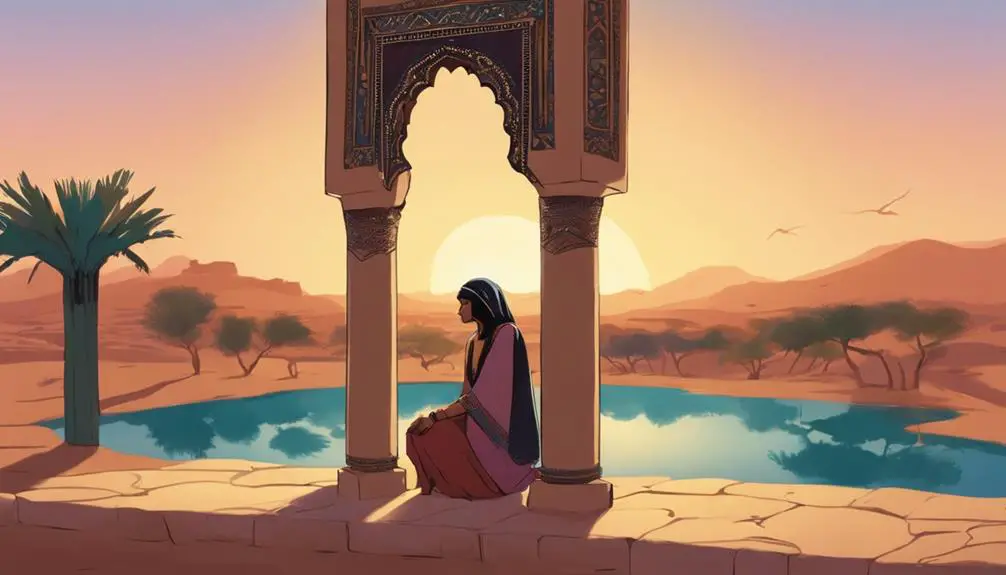
Achsah, a notable figure in biblical narratives, is introduced as the daughter of Caleb, a key leader among the Israelites during their settlement in Canaan. Her story, deeply rooted in the historical and cultural context of the time, provides insight into the complex dynamics of family lineage and marriage arrangements in ancient Israelite society. Achsah's background is significant, not just for her direct relation to Caleb, but also for what her story reveals about the role of women in biblical times.
The marriage arrangement for Achsah is particularly telling. It underscores the strategic alliances formed through matrimonial ties, highlighting the importance of family lineage in securing and consolidating power, land, and influence. Her father, Caleb, offers her hand in marriage to whoever conquers the city of Debir, indicating the utilitarian approach to marriage arrangements prevalent among the Israelites. This move also reflects the patriarchal nature of society, where women's roles were largely determined by their fathers and husbands.
Understanding Achsah's background and the context of her marriage arrangement sheds light on the socio-political and familial structures of ancient Israelite culture. It reveals the intertwined nature of personal identity, family lineage, and socio-political strategy, demonstrating how individuals, especially women, navigated their existence within these frameworks.
The Request for Land
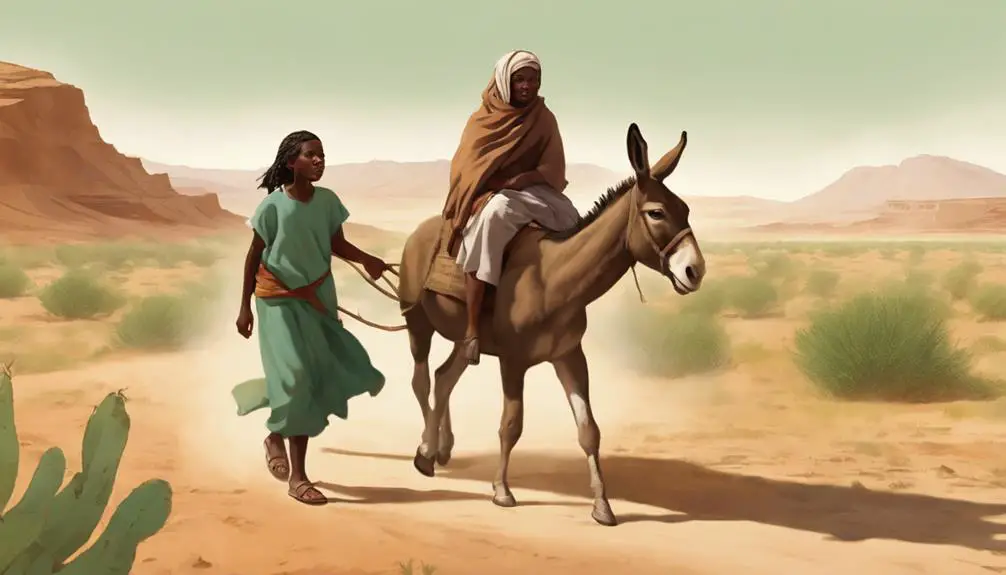
Upon securing her marriage through her father Caleb's unique challenge, Achsah didn't hesitate to leverage her position to request additional land from him, demonstrating a strategic approach to resource acquisition in the ancient context. This move, far from being a mere familial exchange, underscores the complex interplay between marital negotiations and inheritance customs prevalent in her time. Achsah's request wasn't just a personal desire for land but also a keen understanding of the socio-economic frameworks that governed property and wealth distribution.
In the narrative, Achsah's approach to her father isn't merely an act of individual assertiveness but reflects the broader mechanisms of negotiation and inheritance rights within familial structures. Her actions provide a rare glimpse into how women, within the constraints of their societal roles, could exercise agency and influence over their economic circumstances. By foregrounding Achsah's request, the text invites readers to consider the nuanced ways in which women navigated their positions within patriarchal inheritance customs, suggesting that marital negotiations could serve as pivotal moments for altering one's material conditions.
Achsah's story, thus, serves as a critical case study for understanding the intersections of gender, property rights, and familial authority in ancient societies.
The Springs of Water
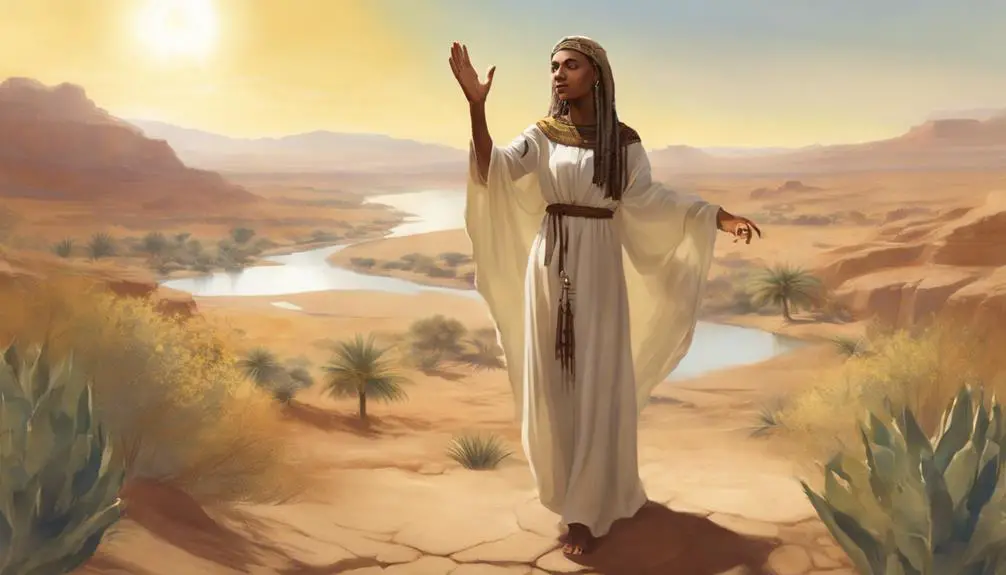
Following her successful land request, Achsah further showcased her strategic acumen by seeking the addition of springs of water, a move underscoring the importance of water resources in ancient agricultural societies. This request wasn't just a simple desire for convenience but a deeply insightful action, highlighting her understanding of the critical elements needed for sustained prosperity and survival.
Water scarcity was a constant threat, making her request not only wise but essential for several reasons:
- Irrigation: The springs would ensure that crops received adequate water, critical in a region where rainfall could be unpredictable.
- Livestock: Access to fresh water was vital for the health and productivity of livestock, an important asset in agrarian societies.
- Human Consumption: Clean water sources were crucial for the health and wellbeing of her people, reducing the risk of waterborne diseases.
The geographical significance of controlling water sources can't be overstated. In a landscape where water was a scarce and valuable resource, owning springs of water was akin to holding the key to wealth, health, and power. Achsah's forward-thinking request reflects a profound understanding of the socio-economic and environmental dynamics of her time.
Achsah's Legacy
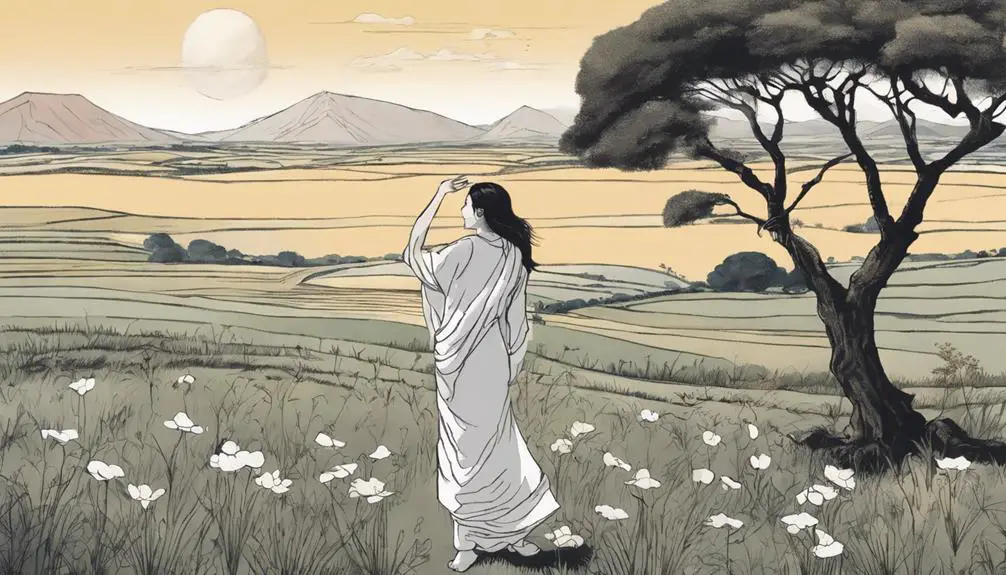
Achsah's strategic insight and requests for land and water resources have cemented her legacy as a figure of profound understanding and foresight in biblical narratives. Her story, while occupying a brief space in the text, opens a wide avenue for cultural interpretation, offering a lens through which to view the nuanced roles women played in ancient societies. Achsah's actions aren't merely personal or familial but resonate with larger themes of survival, prosperity, and negotiation within patriarchal structures.
From a genealogical significance perspective, Achsah stands out as a pivotal figure. Her marriage into the tribe of Judah, coupled with her assertive request for vital resources, underscores the critical role of matrimonial alliances and land in biblical genealogies. These elements aren't just markers of lineage but also of political strategy and economic foresight.
Her legacy, therefore, extends beyond her immediate story, influencing cultural interpretations of women's roles in biblical times. Achsah's narrative is instrumental in understanding the complex interplay between gender, inheritance, and power in ancient texts, offering valuable insights into the societal fabric of the era.
Women's Agency in the Bible
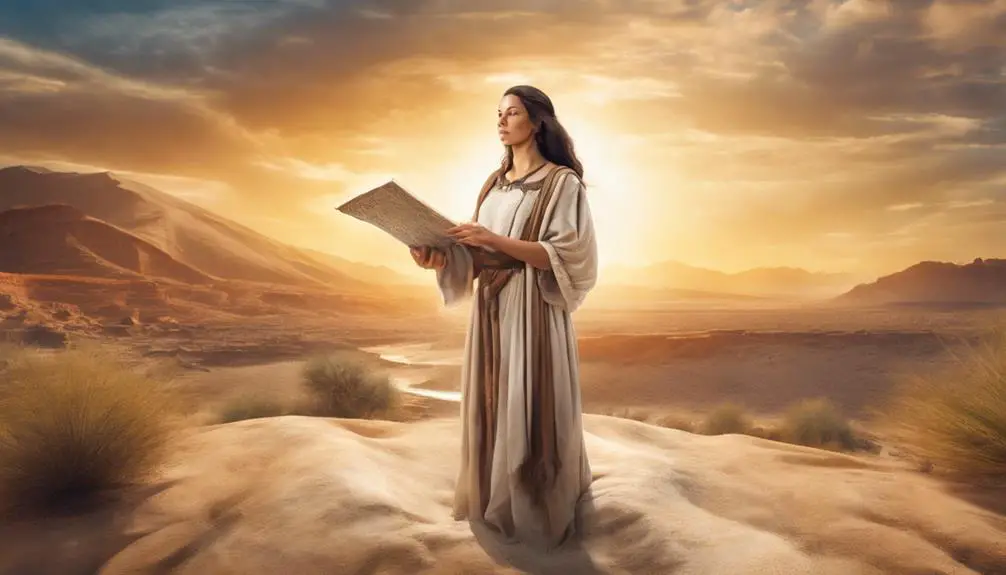
Examining Achsah's narrative illuminates the broader theme of women's agency in biblical texts, revealing complex layers of autonomy and influence within a historically patriarchal framework. Her story, while unique, echoes the experiences of other biblical women who navigated and occasionally subverted the cultural norms of their time to assert their presence and leadership.
Here are three key aspects to consider:
- Female Leadership: Despite the male-dominated narratives prevalent in the Bible, instances of female leadership provide insight into the nuanced roles women played. Figures like Deborah and Esther demonstrate that women weren't only present but pivotal in shaping their communities and historical narratives.
- Cultural Norms: The cultural norms of ancient societies often limited women's public and religious roles. However, stories like Achsah's show women actively participating in and sometimes challenging these norms, suggesting a dynamic interplay between tradition and female agency.
- Interpretive Flexibility: The interpretation of these narratives changes over time, highlighting different aspects of women's agency. Contemporary readings can uncover previously overlooked instances of autonomy and influence, reshaping our understanding of biblical womanhood.
Frequently Asked Questions
How Do Various Religious Traditions Interpret Achsah's Story Differently?
You're diving into how different religious traditions dissect a narrative centered around inheritance and family dynamics.
Without mentioning Achsah directly, it's intriguing to see how these traditions interpret stories of familial negotiations and assets passed down.
Each tradition may emphasize different moral or spiritual lessons, focusing on the characters' motivations, the consequences of their actions, or the divine influence over earthly matters.
This analytical approach offers a rich tapestry of interpretations, enriching our understanding of ancient narratives.
Are There Any Archaeological Findings That Can Be Linked Directly to Achsah or Her Story?
You're looking for archaeological evidence linked to a historical figure without specific context. When focusing on lineage and geographic context, it's crucial to examine artifacts and records from the relevant era and location.
However, directly connecting archaeological findings to individual stories, especially without referencing specific narratives, presents a challenge. Scholarly analysis often relies on piecing together evidence to build a broader understanding of historical events and figures within their societal framework.
How Has Achsah Been Depicted in Art and Literature Throughout History?
Throughout history, Achsah's portrayal in art and literature has evolved, reflecting societal changes and interpretations.
In literature adaptations, she's often a symbol of virtue or rebellion, depending on the narrative's focus. Artists and writers analyze her story through various lenses, exploring themes of faith, gender, and power.
This diversity in depiction highlights the evolving understanding of her character, suggesting that her story offers a rich tapestry for creative and scholarly exploration.
Are There Any Festivals or Religious Observances That Specifically Commemorate Achsah?
You're exploring if there are festivals or religious observances dedicated to commemorating a specific figure.
It's important to note that while some historical or biblical characters have left a significant cultural impact, not all have specific festivals in their honor.
Specifically, regarding Achsah's legacy, there's no evidence of dedicated observances or festivals that celebrate her contributions.
Her cultural impact, though acknowledged in various scholarly discussions, hasn't translated into specific religious or communal commemorations.
How Do Contemporary Feminist Theologians View Achsah's Role and Actions Within the Biblical Narrative?
You'll find that contemporary feminist theologians often view her role as significant in understanding gender dynamics within the biblical narrative.
They analyze her actions, particularly in relation to land inheritance, to illustrate the complexities of women's agency in ancient texts.
This perspective shines a light on how her story challenges traditional views of women's roles and offers insights into the negotiation of power and property in a patriarchal context.
Conclusion
In analyzing Achsah's narrative, it's evident her story illuminates the broader theme of women's agency within the biblical context. Her assertive request for land, and specifically for springs of water, not only underscores her astuteness but also challenges the patriarchal norms of her time.
Achsah's legacy, therefore, extends beyond her immediate familial benefits; it serves as a critical example of female empowerment and advocacy in a historical setting often dominated by male voices.
This analysis encourages a reevaluation of women's roles in biblical narratives.



Sign up